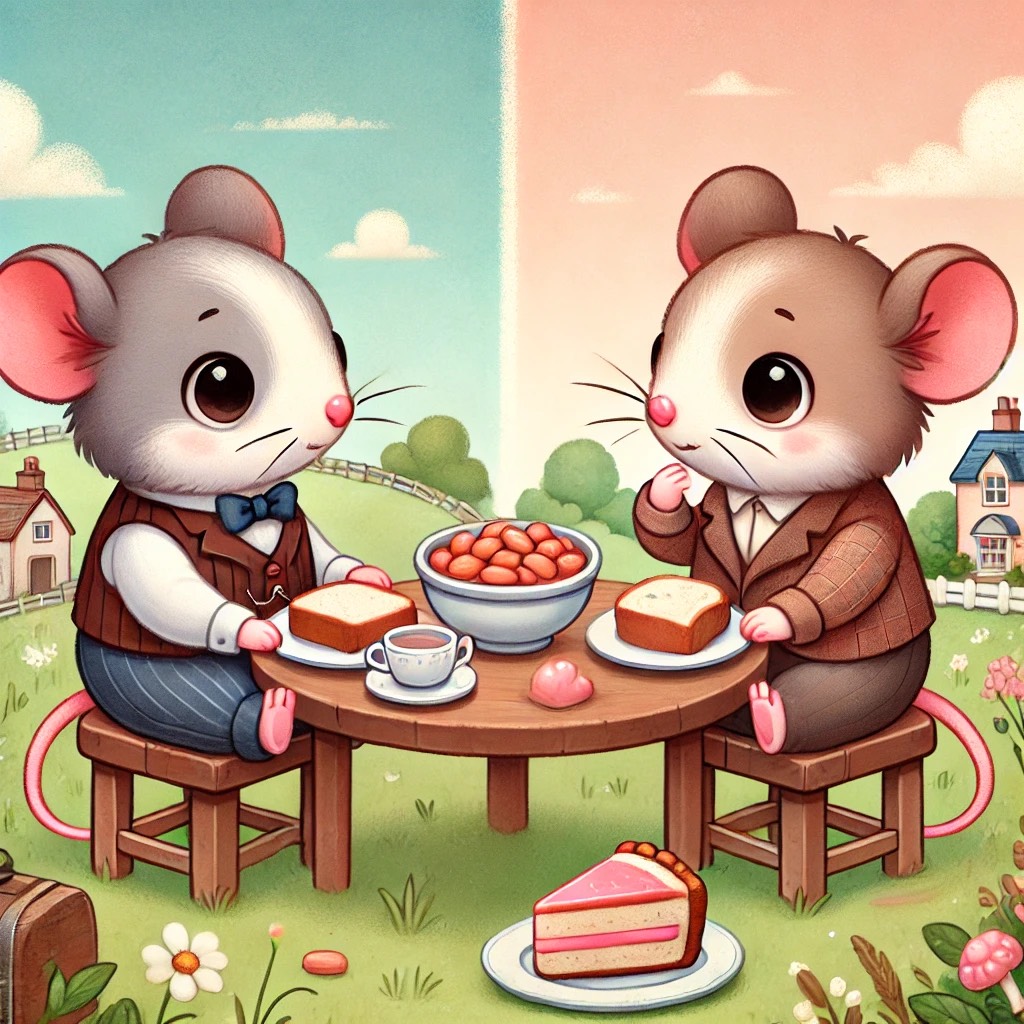One day, a Town Mouse visited his cousin, the Country Mouse. The Country Mouse gave him simple food: beans, bacon, cheese, and bread. But the Town Mouse said, “How can you eat this poor food? Come with me to the town, and I will show you how to live!”
So they went to the town. The Town Mouse took the Country Mouse to a big house. There, they found delicious food: jellies, cakes, and more. The two mice started eating, but soon they heard barking. “What is that?” asked the Country Mouse.
“Just the dogs,” said the Town Mouse. At that moment, two big dogs ran into the room. The mice ran away quickly.
“Goodbye, Cousin,” said the Country Mouse. “Why are you leaving so soon?” asked the Town Mouse.
The Country Mouse replied, “It is better to eat simple food in peace than to eat fancy food in fear.”
town – 町
mouse – ネズミ
visited – 訪れた
cousin – いとこ
country – 田舎
gave – 与えた
simple – 簡単な、質素な
food – 食べ物
beans – 豆
bacon – ベーコン
cheese – チーズ
bread – パン
poor – 貧しい
come – 来る
live – 暮らす
big – 大きい
house – 家
found – 見つけた
delicious – 美味しい
jellies – ゼリー
cakes – ケーキ
started – 始めた
eating – 食べる
heard – 聞いた
barking – 吠える
asked – 尋ねた
dogs – 犬
ran – 走った
away – 遠くに
goodbye – さよなら
soon – すぐに
better – より良い
peace – 平和
fancy – 豪華な
fear – 恐れ
1. One day, a Town Mouse visited his cousin, the Country Mouse.
- One day: 時を表す副詞句です。このように文頭に置くことで、いつの話かを示します。
- a Town Mouse: 名詞句で、主語(主語の名詞部分)。不定冠詞 “a” で「ある町のネズミ」を指しています。
- visited: 過去形の動詞です。主語が「町のネズミ」で、訪れた相手が後に出てくる目的語です。
- his cousin: 所有代名詞 “his” と名詞 “cousin” で目的語を構成しています。
- the Country Mouse: 「田舎のネズミ」という具体的な人物を特定しているので、定冠詞 “the” を使います。
2. The Country Mouse gave him simple food: beans, bacon, cheese, and bread.
- The Country Mouse: 主語です。”the” は定冠詞で、すでに登場した「田舎のネズミ」を特定しています。
- gave: 過去形の動詞。「与える」の過去形。
- him: 代名詞で、間接目的語として使われています。「彼に」という意味です。
- simple food: 直接目的語です。”simple” は「質素な」という意味の形容詞で、”food” を修飾しています。
- beans, bacon, cheese, and bread: 名詞のリストで、「豆、ベーコン、チーズ、パン」という食べ物の具体例を列挙しています。
3. But the Town Mouse said, “How can you eat this poor food?”
- But: 接続詞です。前文と対比を表現しています。
- the Town Mouse: 主語です。ここでも定冠詞 “the” を使用し、特定のネズミを指しています。
- said: 過去形の動詞で、「言った」を意味します。
- “How can you eat this poor food?”: 直接話法で、疑問文です。
- How: 疑問副詞で「どのように」を意味します。
- can: 助動詞。「できる」の意味を表します。
- you: 主語。
- eat: 動詞の原形です。
- this poor food: 目的語。”this” は指示詞、「この」を意味し、”poor food” は「質の悪い食べ物」という意味です。
4. Come with me to the town, and I will show you how to live!
- Come: 命令形の動詞で「来て」の意味。
- with me: 前置詞 “with” と代名詞 “me” で「私と一緒に」を表します。
- to the town: 前置詞句。”to” は方向を表す前置詞で、「町へ」を意味します。
- and: 接続詞で、二つの文をつなげています。
- I will show you: 未来形。”will” は未来を表し、「見せるつもりだ」という意味です。
- I: 主語。
- show: 動詞。
- you: 目的語。
- how to live: 間接疑問文。「どうやって生きるか」を意味します。
- how: 疑問詞。
- to live: 不定詞の名詞句で「生きること」を表します。
5. So they went to the town.
- So: 接続詞で「だから」を意味します。前の文を受けて結論を表します。
- they: 主語で「彼ら」を指します。
- went: 動詞の過去形で「行った」の意味。
- to the town: 前置詞句。”to” は場所への移動を表します。「町へ」の意味です。
6. The Town Mouse took the Country Mouse to a big house.
- The Town Mouse: 主語。
- took: 動詞の過去形。「連れて行った」の意味です。
- the Country Mouse: 目的語です。「田舎のネズミ」を指します。
- to a big house: 前置詞句。”to” は目的地を表し、「大きな家へ」の意味です。
- a big house: 不定冠詞 “a” が使われていて、特定されていない大きな家を表します。
7. There, they found delicious food: jellies, cakes, and more.
- There: 副詞で「そこ」を意味します。
- they: 主語。
- found: 動詞の過去形。「見つけた」の意味です。
- delicious food: 目的語。”delicious” は「おいしい」という意味の形容詞で、”food” を修飾しています。
- jellies, cakes, and more: 「ゼリー、ケーキ、その他のもの」を列挙した名詞句です。
8. The two mice started eating, but soon they heard barking.
- The two mice: 主語。
- started eating: 「食べ始めた」という進行形の動詞。”start” は動名詞を伴う形で使われています。
- but: 接続詞。「しかし」を意味します。
- soon: 副詞で「すぐに」の意味。
- they heard barking:
- they: 主語。
- heard: 動詞の過去形。「聞いた」の意味。
- barking: 動名詞。「吠える声」を意味します。
9. “What is that?” asked the Country Mouse.
- What is that?: 疑問文。
- What: 疑問詞。
- is: 動詞。
- that: 指示代名詞。
- asked: 動詞の過去形。「尋ねた」の意味。
- the Country Mouse: 主語。
10. “Just the dogs,” said the Town Mouse.
- Just the dogs: 「ただ犬だよ」という直接話法。
- said: 動詞の過去形。
- the Town Mouse: 主語。
11. At that moment, two big dogs ran into the room.
- At that moment: 副詞句。「その瞬間に」を意味します。
- two big dogs: 主語。数詞 “two” と形容詞 “big” が “dogs” を修飾しています。
- ran into the room: 動詞の過去形 “ran” と前置詞句 “into the room”(「部屋の中へ」)。
12. The mice ran away quickly.
- The mice: 主語。
- ran away: 動詞の過去形。「逃げた」の意味。
- quickly: 副詞で「素早く」。
13. “Goodbye, Cousin,” said the Country Mouse.
- Goodbye, Cousin: 直接話法。「さようなら、いとこ」。
- said: 動詞の過去形。
- the Country Mouse: 主語。
14. “Why are you leaving so soon?” asked the Town Mouse.
- Why are you leaving so soon?: 疑問文。
- Why: 疑問詞。
- are leaving: 現在進行形。
- so soon: 副詞句で「そんなに早く」。
- asked: 動詞の過去形。
- the Town Mouse: 主語。
15. “It is better to eat simple food in peace than to eat fancy food in fear.”
- It is better: 形式主語 “It” を用いた構造。「それはより良い」の意味。
- to eat simple food: 不定詞句で、「質素な食べ物を食べること」。
- in peace: 前置詞句で、「平和な状況で」。
- than to eat fancy food: 比較級の構造で、「豪華な食べ物を食べるよりも」の意味。
- in fear: 前置詞句で、「恐怖の中で」。



コメント